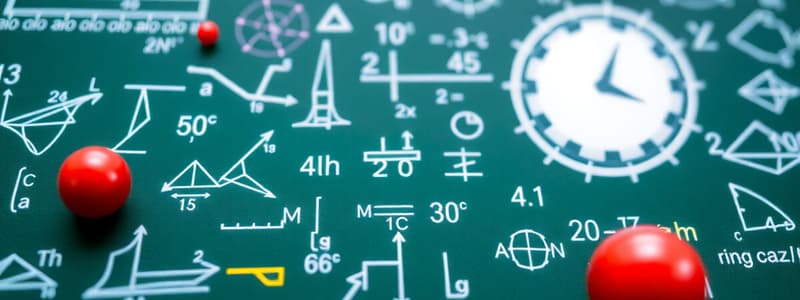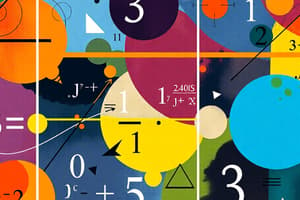Podcast
Questions and Answers
Which field is primarily concerned with developing algorithms?
Which field is primarily concerned with developing algorithms?
- Social Sciences
- Computer Science (correct)
- Economics
- Finance
What is the first step in the problem-solving process in mathematics?
What is the first step in the problem-solving process in mathematics?
- Devising a plan
- Looking back
- Carrying out the plan
- Understanding the problem (correct)
In which area is mathematics NOT typically applied?
In which area is mathematics NOT typically applied?
- Science
- Engineering
- History (correct)
- Astronomy
Which of the following describes the step of implementing a chosen strategy to find a solution?
Which of the following describes the step of implementing a chosen strategy to find a solution?
What role does mathematics play in finance?
What role does mathematics play in finance?
What does mathematics fundamentally deal with?
What does mathematics fundamentally deal with?
Which branch of mathematics focuses on the study of shapes and sizes?
Which branch of mathematics focuses on the study of shapes and sizes?
What is a unique feature of functions in mathematics?
What is a unique feature of functions in mathematics?
What is the focus of calculus in mathematics?
What is the focus of calculus in mathematics?
Which of the following accurately describes linear equations?
Which of the following accurately describes linear equations?
What is the main focus of statistics within mathematics?
What is the main focus of statistics within mathematics?
Which branch of mathematics studies the likelihood of events occurring?
Which branch of mathematics studies the likelihood of events occurring?
What do mathematical proofs aim to demonstrate?
What do mathematical proofs aim to demonstrate?
Flashcards
Arithmetic
Arithmetic
The study of numbers and how they are combined.
Algebra
Algebra
A branch of mathematics dealing with symbols and their manipulation to solve equations. It involves variables and their relationships.
Geometry
Geometry
The study of shapes, sizes, and their properties in space.
Trigonometry
Trigonometry
Signup and view all the flashcards
Calculus
Calculus
Signup and view all the flashcards
Statistics
Statistics
Signup and view all the flashcards
Probability
Probability
Signup and view all the flashcards
Number Theory
Number Theory
Signup and view all the flashcards
Graphs
Graphs
Signup and view all the flashcards
Science
Science
Signup and view all the flashcards
Engineering
Engineering
Signup and view all the flashcards
Problem Solving in Mathematics
Problem Solving in Mathematics
Signup and view all the flashcards
Looking Back
Looking Back
Signup and view all the flashcards
Study Notes
Introduction to Mathematics
- Mathematics is a fundamental science dealing with logic, quantity, and space.
- It involves the study of numbers, shapes, and patterns.
- It uses symbolic language to represent and solve problems.
- Mathematics has a wide range of applications in various fields, including science, engineering, finance, and computer science.
Branches of Mathematics
- Arithmetic: The study of numbers, operations on numbers, and basic properties.
- Algebra: The study of symbols and rules for manipulating them to solve equations and relationships between variables.
- Geometry: The study of shapes, sizes, and positions of figures in space.
- Trigonometry: The study of relationships between angles and sides of triangles.
- Calculus: A branch of mathematics concerned with change and motion.
- Includes differential and integral calculus.
- Statistics: The science of collecting, analyzing, interpreting, and presenting data.
- Probability: The study of the likelihood of events occurring.
- Number Theory: The study of integers and their properties.
- Discrete Mathematics: The study of mathematical structures that are not continuous.
- Linear Algebra: The study of vector spaces and linear transformations.
- Topology: The study of shapes and their properties under continuous transformations.
Fundamental Concepts
- Sets: Collections of objects.
- Relations: Connections between elements of sets.
- Functions: Specific types of relations where each input has a unique output.
- Numbers: Different types of numbers, including natural, whole, integers, rational, irrational, and real numbers.
- Operations: Mathematical processes like addition, subtraction, multiplication, division, exponentiation, etc.
- Equations: Statements of equality between expressions.
- Linear equations: Equations with variables to the power of 1.
- Quadratic equations: Equations with variables to the power of 2.
- Inequalities: Relationships expressing that one quantity is greater than or less than another.
- Proofs: Methods to demonstrate the truth of mathematical statements.
Mathematical Tools
- Symbols: Language used to express mathematical concepts and relationships.
- Notation: Specific representations for mathematical objects.
- Formulas: Equations that represent relationships between variables.
- Algorithms: Step-by-step instructions for solving a problem.
- Graphs: Visualizations for mathematical relationships and data.
Applications of Mathematics
- Science: Modelling physical phenomena.
- Engineering: Designing and analyzing structures and systems.
- Finance: Analysing investment portfolios and risk management.
- Computer Science: Developing algorithms and software.
- Economics: Building economic models.
- Social Sciences: Analyzing data and developing theories.
Problem Solving in Mathematics
- Understanding the problem: Identifying the given information and the desired outcome.
- Devising a plan: Choosing an appropriate strategy, like using a formula, drawing a diagram, or using logic.
- Carrying out the plan: Implementing the chosen strategy to find a solution.
- Looking back: Checking the answer and verifying its reasonableness.
Studying That Suits You
Use AI to generate personalized quizzes and flashcards to suit your learning preferences.




